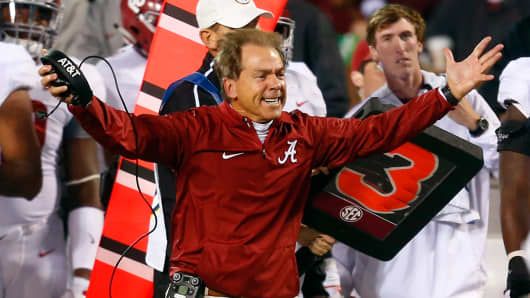There are a lot of partisan battle lines in the Republican tax reform law. But one provision should be celebrated by Republicans, Democrats, and anyone who cares about the true causes of charity, education and health care in America.
The new provision pours some cold water on million dollar salaries at nonprofit organizations.
It's important to remember that nonprofit organizations actually make profits; sometimes even huge profits. They generally get the nonprofit designation and the tax advantages that come with it because they don't have shareholders and are deemed to be doing a service to the community. The money these organizations make every year above expenses is usually paid out to employees, often with very large salaries to a few executives at the top.
No, not all nonprofit groups in America have overpaid executives. But the trend of paying huge salaries for leading executives at colleges, hospitals, and charities, has been growing for years. Earlier this year, the Wall Street Journal combed through the most recently available IRS data and found that 2,700 employees at U.S. nonprofits were paid more than $1 million in 2014. All indications are that the number has grown even more since then.
The most common explanation for this is that nonprofits need to pay top executive candidates higher salaries to compete with the private sector. But that explanation just doesn't cut it when you look at some of the salaries and who's paying them:
- Hospital system United Health Services in Pennsylvania paid CEO Alan Miller $51.3 million in 2016.
- Savannah College of Art Design President Paula Wallace was paid $9.6 million in 2014.
- 58 private university presidents made $1 million or more in 2015, led by Wake Forest University's Nathan O. Hatch at more than $4 million.
- Eight public university presidents made salaries of $1 million or more in 2016, led by Arizona State's Michael Crow at $1.55 million.
- Hal and JoLynn Lindsey, who run the Hal Lindsey Online Ministries, made $4 million that year. That was almost half their nonprofit's total revenue.
- Judge Roy Moore, yes THAT Judge Roy Moore, was paid a $180,000 per year salary as the nominal president for the Foundation for Moral Law from 2007-2012.
And then there's the granddaddy of them all: College football head coach salaries. No fewer than 78 of them currently make more than $1 million per year, led by the University of Alabama's Nick Saban at more than $11 million per year.
Just think of it. At a time when more Americans are facing rising medical bills and tuition costs, hospitals and colleges are paying their executives sometimes enormous salaries all without the kinds of taxes regular companies face. Plus, they still get to ask for donations and public support thanks to that "nonprofit" designation.
So what is the new tax law going to do about it?
Every organization that pays a salary of more than $1 million per year to any of its top five earning employers will face a stiff new 21 percent excise tax. That means any nonprofit-designated charity, college, and hospital that routinely asks us for donations, or charges expensive tuition or medical bills will have to justify paying those high salaries against a hefty new tax.
There's another reason why this smack down on high salaries is needed. Every time super high pay packages at nonprofits make it into the news, it undermines the organizations' usually good causes. One harrowing example of this came in the 1990s when the United Way suffered under the weight of back-to-back bouts of bad publicity.
First, United Way CEO William Aramony was forced out of his job after the public learned he was using his rich salary and the charity's operating funds for lavish expenses and even to finance an affair with a teen girl. Then his successor, current Transportation Secretary Elaine Chao, faced criticism for her large salary and departure payment. In the wake of those and other spending controversies, donations to the United Way went down.
So far, most elite universities in America have avoided any real backlash in response to high executive pay. But many colleges in the middle tier are suffering. One Harvard Business School professor believes half of American colleges could be bankrupt within the next few decades. The former leaders of Burlington College in Vermont, which already went bankrupt, are under heavy scrutiny right now. That scrutiny includes questions about the relatively high salary Burlington paid its last president, Jane Sanders, who is married to Senator Bernie Sanders.
Of course, nonprofits are still getting away with tremendous advantages. The deduction for charitable donations was preserved. So was the tax exemption for bonds hospitals often rely on for expansions and repairs. Deductions for student loan interest and grad student tuition waivers were also saved.
No one should cheer new taxes. But for-profit companies with much higher tax burdens have found a way to pay high salaries and retain top executives in competitive markets for decades. Meanwhile, nonprofit companies make big money without those tax burdens and then shovel those profits to their top executives. That's an uneven playing field they enjoy no matter what the IRS calls them. This new tax goes a long way to evening that playing field and it's long overdue.
Commentary by Jake Novak, CNBC.com senior columnist. Follow him on Twitter @jakejakeny.
For more insight from CNBC contributors, follow @CNBCopinion on Twitter.



